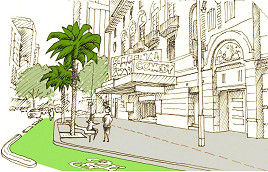Council’s call to action on waste
Advertorial by Sean Car
While local councils across the state continue working behind the scenes to resolve our recycling crisis, the City of Melbourne is encouraging its residents to play an active role in being part of the solution on waste.
City of Melbourne recycling program officer Ian Clarke caught up with CBD News last month to shed light on the many different ways the community could still make a significant impact in reducing its waste to landfill.
Mr Clarke said the council’s transfer station at Dynon Rd in West Melbourne was now open for residents to drop off their regular recycling items. However, he said it was important that glass was kept separate from other recycling.
“All of the cardboard and paper gets bailed at Dynon Rd and goes to Visy Recycling for processing,” Mr Clarke said.
“The broader public perception is that everything is going to landfill but that’s not the case. We put actions in place to divert different streams that we can still recover.”
While a solution is being sought to recycle plastics following the closure of recycling company SKM, Mr Clarke said locals could still recycle other forms of waste such as organics, e-waste and hard waste.
In the first instance, he said it was important for community members to continue recycling as usual, while trying to limit how much plastic they purchase every day.
“My role is to encourage people to continue recycling but the best thing to do is to try and change your purchasing habits,” Mr Clarke said. “When you go to the supermarket, don’t buy over-packaged goods.”
“Consider what you’re doing with food because food scraps and organics make up approximately 50 per cent of our landfill bins. So, ask yourself: ‘do I have the capacity to compost that at home?’”
“We need people to stop throwing small items of e-waste in the bin. Most people won’t throw phones in the bin but it’s all the accessories - headphones, chargers, cables and batteries - that we can also recover.”
With around 75 per cent of the municipality’s residential bins located in high-rise buildings, he said these messages were particularly crucial for those living in communities such as the CBD, Docklands and Southbank.
The council has for several years run a tailored waste management program in high-rise towers. Many residents would be well aware of the different e-waste and charity bins (managed by Diabetes Victoria) that are already accessible in around 150 buildings.
“We’re constantly working with building managers to try to encourage them to reduce contamination in their recycling bins and to educate residents as they move in as to how waste works within their building,” Mr Clarke said.
“We’re also trying to reduce the amount of hard waste. When Diabetes Victoria goes into the buildings now, they go through the hard waste and take out any good furniture to sell on at their stores.”
In another example of residents taking action, he said that some buildings had even set up “reuse” areas where people could swap larger items with their neighbours.
As part of the awareness efforts, Mr Clarke was keen to remind locals that they could cash in on discounts of up to 50 per cent for compost bins and worm farms via its partnership with social enterprise The Compost Revolution.
He said he was also constantly encouraging high-rise residents to hassle their building managers and Owners’ Corporations to find space on rooftops or in communal areas to build raised garden beds for vegies and composting.
“If you can keep compost on your property and use it on the garden then happy days,” he said. “Get a group of residents together who are keen to get the space. It could be on the roof or in a communal area. Get a raised garden bed in there and grow some vegies!”
City of Melbourne has also established a permanent drop off zone for e-waste at Kathleen Syme Community Centre in Carlton, as well as battery collection services at City Baths and City Library.
On September 21, it will also host a free e-waste recycling day in partnership with Tech-Collect at Argyle Square in Carlton, where residents can save their old phones, computers or appliances from landfill.
City of Melbourne also supports businesses and the community to produce less waste. Its small business grants program provides up to $100,000 for proposals that focus on reducing waste, with a new series of grants to open in October.

Council endorses office tower at Flinders Lane despite querying car park demolition






 Download the Latest Edition
Download the Latest Edition